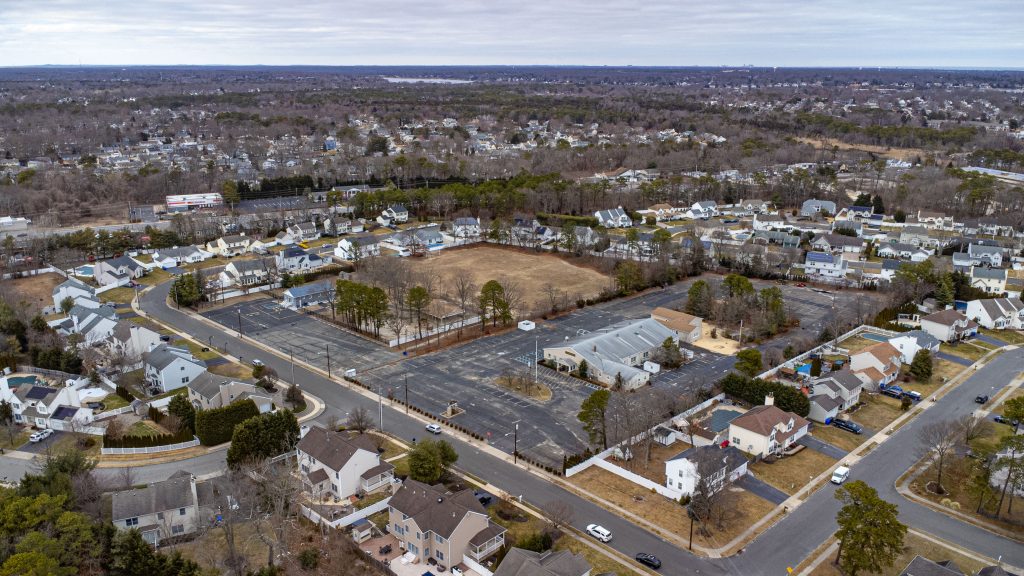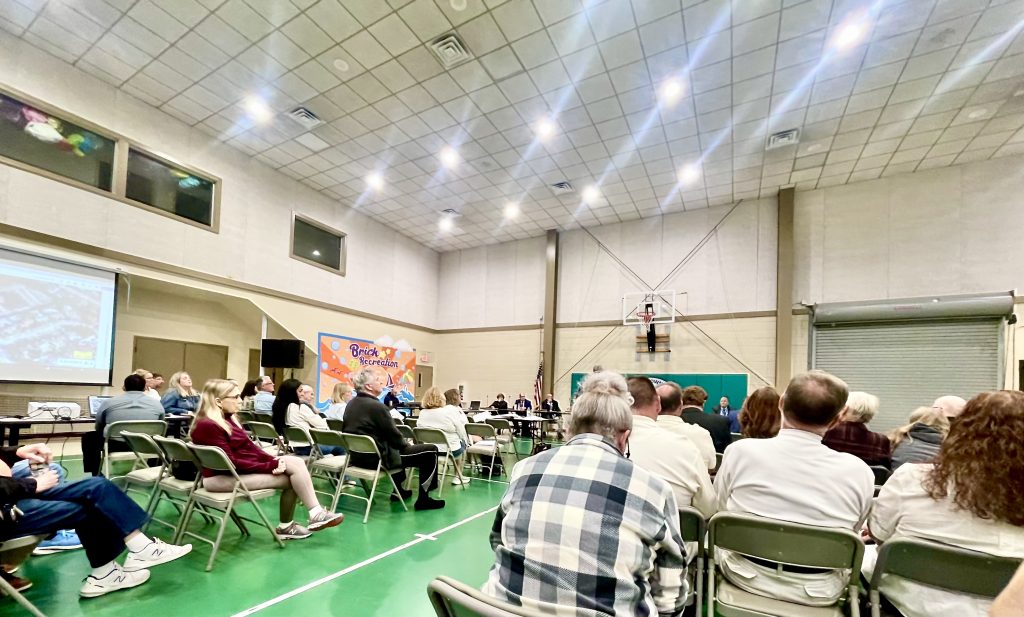
Fellowship Chapel, the site of a proposed school, at 170 Duchess Lane, Brick, N.J. (Photo: Shorebeat)
The controversial plan for the Liberty School Association, which describes itself as a private member association, to operate a home-school meeting facility inside a Brick Township church has yet to reach its conclusion after nearly a year-long string of hearings.
The township’s Board of Adjustment, often referred to as the zoning board, held the latest of several marathon hearings Tuesday night, primarily characterized by a discussion of traffic that could be generated by the quasi-school. Plans call for the school to meet in the Fellowship Chapel, a Christian church located at 170 Duchess Lane – a property surrounded on all sides by residential homes. About 80 residents of the community are formally objecting to the proposal through their attorney, Edward Liston. The residents hold that since the use of the facility as a school does not meet conditions set forth in the township’s zoning ordinance, the application should be denied.
Wednesday’s hearing focused almost exclusively on traffic that could be generated by the school use, with experts and officials debating whether an increase in traffic represents a “substantial detriment” to the community. The “substantial detriment” standard is one that must be met by objectors if the proposed use of a building is “inherently beneficial.” In this case, the church has argued that leasing its facilities to the home schooling group constitutes an inherently beneficial use under the state’s definition, and what they view as a minimal influx of traffic does not produce a substantial detriment.
|
|

Neighbors gather to hear the application of a school to be operated at Fellowship Chapel, on Duchess Lane in Brick Township, Oct. 1, 2024. (Photo: Shorebeat)
Neighboring residents have raised concerns that once the site is approved for the school use, the use could be transferred to a future owner who would make the same arguments to support an even larger school. The residents have also raised concerns over parents dropping off and picking up students – there is no planned bus transportation to the site – at the same time many neighborhood children are walking to their own school bus stops could present a detrimental safety hazard.
Marc Leber, a planner representing Fellowship Chapel, said the number of trips generated by the school use would be “negligible.”
“In terms of traffic impact, it is negligible,” he said. “In contrast to, perhaps, an elementary school that has 600 or so children … testimony has been provided on the record that the enrollment is limited to dropoff and pickup and there are no buses.”
Leber testified that the private home-school association – whose organizers had previously operated the school without a zoning permit at another location – would likely be limited by condition of approval to 30 to 40 students, and violations could be reported to the township if the student population were to grow.
“Is it appropriate that the neighbors have to police the use?” asked Township Planner Tara Paxton.
Leber replied that code enforcement in Brick often runs on a tip or call system, and potential violations may also be detected during annual fire inspections.
“If someone were to come in later on to increase that enrollment, change the hours, or run a school at night – whatever – they would have to come back to this board and do this all over again,” said Leber. “It’s not like this applicant can get an approval and open up, say, a boarding school. It doesn’t work that way.”
Leber conceded that the school may constitute a second principal use of the property (the first being the existing church), but held that its impact on the neighborhood would be minimal.
“It doesn’t really concern me since the hours don’t overlap with the activities of the church,” he said. “I don’t see any fatal detriments here that negate the ability of the conditional use to exist on this property.”
Board Chairman David Chadwick, however, raised concerns over the influx of traffic the school would produce given the residential uses surrounding the property and the fact that Duchess Lane is a “lower order” street, which was not contemplated to support the use of a school.
“It seems to me that the impact on the lower order street is pretty substantial,” he said. “It’s a five-fold increase. It looks to me … that we’re going to have 28 to 30 vehicles coming in the morning, somewhere between 8:30 and 8:45 a.m., and that is a prime time for public school children to be picked up by buses and other transportation. Is that a potential detriment in terms of that amount of traffic on a lower order street in a very condensed period of time?”
Leber replied that most public school busing occurs earlier, leading to groans of disagreement from about 100 neighboring residents who attended the meeting.
Another traffic consultant, Joseph Fishinger of Bright View Engineering, said any use that generates less than 50 trips is “unlikely” to be detrimental.
“The state considers a significant increase in traffic 100 trips,” he said. “On a lot of local applications, 100 is too high of a threshold. The lowest threshold I’ve ever seen for a traffic impact study is 25 trips. If the site generates less than 50 trips, it’s unlikely to have a substantial impact.”
Liston has yet to present his case, which is expected to include rebuttal witnesses and potentially more cross examinations. With the meeting ending at 10 p.m., Chadwick and his colleagues decided at about 9:45 p.m. to wrap up the meeting and proceed with Liston’s case at a future date, later determined to occur in December.
The application for the school use has now been pending for nearly a year. The Liberty School Association, created by township resident Rebeka Snegon, is what has become known as a “private membership organization.” Board members, in addition to taking into considerations issues of traffic and similar concerns, have been tasked with determining what, exactly, the association is. The group was previously on record stating that the school is merely a meetingplace for parents who want to home school their children in a group setting, but is not a “home school cooperative” under state law. The group has also said they are not religious in nature and do not charge tuition, but later stated they use a Christian-themed curriculum. In the past, the organization has advertised tuition rates.
Home schooling in New Jersey is virtually unregulated, however different regulations apply to private schools and religious schools. Testimony has varied as to which category best fits the Liberty School Association.
The hearing will continue Tuesday, Dec. 10, 2024 at 7 p.m. in the auditorium at Civic Plaza, 270 Chambers Bridge Road.











